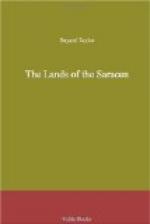This evening the forbidden subject of politics crept into our quiet community, and the result was an explosive contention which drowned even the braying of the agonizing trumpets outside. The gentlemanly Frenchman is a sensible and consistent republican, the old filateur a violent monarchist, while Absalom, as I might have foreseen, is a Red, of the schools of Proudhon and Considerant. The first predicted a Republic in France, the second a Monarchy in America, and the last was in favor of a general and total demolition of all existing systems. Of course, with such elements, anything like a serious discussion was impossible; and, as in most French debates, it ended in a bewildering confusion of cries and gesticulations. In the midst of it, I was struck by the cordiality with which the Monarchist and the Socialist united in their denunciations of England and the English laws. As they sat side by side, pouring out anathemas against “perfide Albion,” I could not help exclaiming: “Voila, comme les extremes se rencontrent!” This turned the whole current of their wrath against me, and I was glad to make a hasty retreat.
The physician again visited us to-night, to promise a release to-morrow morning. He looked us all in the faces, to be certain that there were no signs of pestilence, and politely regretted that he could not offer us his hand. The husband of the “married woman” also came, and relieved the other gentlemen from the charge of the “weeper.” He was a stout, ruddy Provencal, in a white blouse, and I commiserated him sincerely for having such a disagreeable wife.
To-day, being the last of our imprisonment, we have received many tokens of attention from dragomen, who have sent their papers through the grate to us, to be returned to-morrow after our liberation. They are not very prepossessing specimens of their class, with the exception of Yusef Badra, who brings a recommendation from my friend, Ross Browne. Yusef is a handsome, dashing fellow, with something of the dandy in his dress and air, but he has a fine, clear, sparkling eye, with just enough of the devil in it to make him attractive. I think, however, that, the Greek dragoman, who has been our companion in Quarantine, will carry the day. He is by birth a Boeotian, but now a citizen of Athens, and calls himself Francois Vitalis. He speaks French, German, and Italian, besides Arabic and Turkish, and as he has been for twelve or fifteen years vibrating between Europe and the East, he must by this time have amassed sufficient experience to answer the needs of rough-and-tumble travellers like ourselves. He has not asked us for the place, which displays so much penetration on his part, that we shall end by offering it to him. Perhaps he is content to rest his claims upon the memory of our first Quarantine dinner. If so, the odors of the cutlets and larks—even of the raw onion, which we remember with tears—shall not plead his cause in vain.




